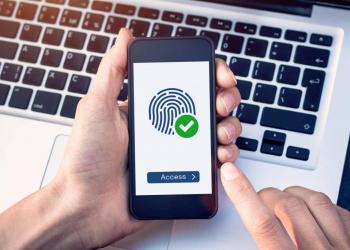
Court Rules Forcing Parolees to Use Biometrics to Unlock Phones Is Lawful
The forced use of a suspect’s thumbprint to open his cellphone, when the suspect is subject to a parole Fourth waiver, is lawful. Forcing a suspect to open his cellphone via the use of his thumbprint does not violate that suspect’s Fifth Amendment self-incrimination privilege. Where a search warrant obtained for a suspect’s residence shows probable cause justifying the search even after redacting information obtained during an illegal security sweep of the residence, whether or not the security sweep was legal is irrelevant.
Defendant Jeremy Travis Payne was sentenced to three years in prison after having been convicted of assault upon a peace officer (P.C. § 245(c)), stemming from an incident that occurred in November, 2018. Released on parole on September 23, 2020, defendant signed the standard “Notice and Conditions of Parole” document which included the following general search condition: “You, your residence, and any property under your control are subject to search or seizure by a probation officer, an agent or officer of the California Department of Corrections and Rehabilitation, or any other peace officer, at any time of the day or night, with or without a search warrant, with or without cause.” Attached to that was a three-page “Special Conditions of Parol” document that included the following concerning electronic devices: “You shall surrender any digital/electronic device and provide a pass key/code to unlock the device to any law enforcement officer for inspection other than what is visible on the display screen. This includes any digital/electronic device in your vicinity. Failure to comply can result in your arrest pending further investigation and/or confiscation of any device pending investigation.”
On November 3, 2021, California Highway Patrol Officers Coddington and Garcia—assigned to the Coachella Valley Crime Gang Taskforce—observed defendant driving a gold Nissan in the Desert Hot Springs area with unlawfully tinted front windows; a violation of V.C. § 26708. Upon making a traffic stop, an extremely nervous “sweating profusely,” “stammering” defendant informed the officers that he was on parole. Upon confirming defendant’s parole status via the police radio, defendant was searched pursuant to his parole conditions, resulting in the recovery of $1,270 in cash and a key ring with several keys, including a key to a BMW. Upon retrieving defendant’s cellphone from the car, Officer Coddington asked defendant for the password. Defendant claimed at that point that the cellphone was not his, contrary to earlier assertions that it was. So Officer Coddington grabbed defendant’s hand and forced him to press his thumb to the screen, opening the phone via a built-in biometric unlocking feature. Upon doing so, and checking the phone’s settings, it was confirmed that it was indeed defendant’s cellphone. So the Officer searched the contents of the phone, finding some videos depicting a large amount of U.S. currency, several bags of blue pills (suspected to be fentanyl), and a gold money counting machine. Defendant was seen in one of the videos referring to the room in which the video was made as his “office.” Another video in defendant’s cellphone depicted a residence with a gray-brick wall around the front. In that same video, defendant could be seen saying; “life is good in Palm Desert” and “I got the Beamer out front,” in apparent reference to a parked BMW vehicle shown in the video.
Checking the maps application on defendant’s cellphone, Officer Coddington found a pin dropped to a parked vehicle on a street called El Cortez Way in Palm Desert; about 25 miles from their current location. Despite defendant’s assertions that he did not live there, the officers drove him to the residence at that location. Upon finding a silver BMW parked in front of the residence, it was determined that it was registered to defendant. Also, the key recovered earlier from his person opened the BMW. Another key on the same keyring unlocked the door to the residence.
The officers entered the home and conducted what they referred to as a “security sweep” to “make sure there was no one inside the residence who could possibly come out of the residence and harm [the officers].” During sweep, the officers observed in plain sight several bags of blue pills suspected to be fentanyl and a money-counting machine consistent with what they had earlier observed in the first video on defendant’s cellphone A search warrant was subsequently obtained for the residence listing in its probable cause statement the information the officers had obtained from defendant’s cellphone, as described above, as well as observations made during the sweep of the home.
Upon execution of the warrant, documents were recovered showing defendant as the resident. Also recovered was a “white powdery substance” throughout the home and a total of 104.3 grams of blue pills marked “M/30,” later confirmed to be fentanyl, fluorofentanyl, and cocaine. In addition to the drugs, officers recovered a total of $13,992 in cash, a digital scale, the gold money-counting machine, and six cellphones. Defendant was formally arrested following this search. Charged with a whole host of drug-related charges in federal court, defendant’s motion to suppress was denied by the district (trial) court. Upon being found guilty (the Court did not specify whether that was by plea, or a jury verdict), defendant was sentenced to 12 years in prison.
Defendant appealed.





